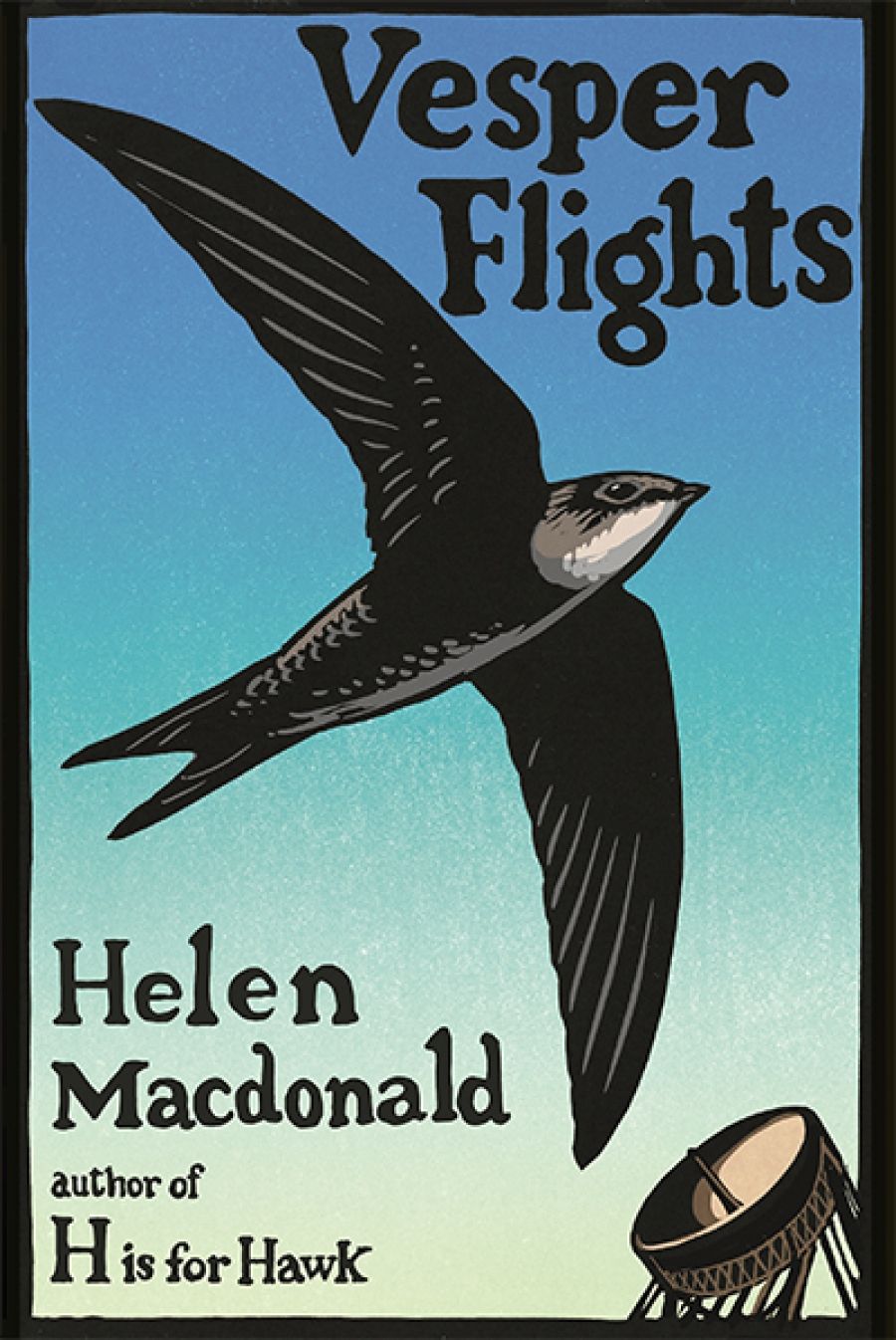
- Free Article: No
- Contents Category: Essay Collection
- Review Article: Yes
- Custom Highlight Text:
The world evoked by British nature writer and historian Helen Macdonald in her new collection of essays is haunted by no end of unsettling and shrouded presences. The sight of a flock of starlings gives her a shiver of fear. Why? Because in her imagination the flock connects with a mass of refugees. The sight of falcon eggs in an incubator makes her unaccountably upset. Then she remembers that she, too, as a very premature baby, was once kept alive in just such a box. And on it goes.
- Grid Image (300px * 250px):

- Book 1 Title: Vesper Flights
- Book 1 Subtitle: New and collected essays
- Book 1 Biblio: Jonathan Cape, $35 hb, 272 pp
- Book 1 Readings Link: booktopia.kh4ffx.net/56902
 Helen Macdonald (photograph by Marzena Pogorzaly/Penguin)
Helen Macdonald (photograph by Marzena Pogorzaly/Penguin)
And yet it’s curious that Macdonald should be disquieted or discomposed by what she perceives hovering like a revelation behind the birds and animals and the other natural phenomena she describes. Vesper Flights, her first book since the immensely popular and critically acclaimed H Is for Hawk (2014), compiles more than forty short, magazine-style articles, including profiles, cultural analysis, colour pieces, humorous sketches, and piecemeal snatches of memoir. The subjects are diverse, but what unites the collection is a distinctly gothic tendency and fascination with sensations of strangeness.
Consider, for example, the essays recalling her solitary and unconventional youth. As a girl, she tells us, she had the instincts of an amateur naturalist and delighted in collecting interesting bits of dead things. She roamed through woods and meadows, chasing grass snakes, hunting newts, listening to birds, and watching insects. She prepared skeletons of small creatures by folding them in little cages of wire mesh. Glass aquaria and vivaria and old bird nests lined her bookshelves. And she adopted an orphaned crow and a lost badger cub.
Was the loss of her twin brother at birth, she wonders, the source of this childish compulsion to seek out wild creatures, alive or dead? In any case, it all sounds like a darkly romantic fairytale of a childhood: all it needs is a secret, high-walled garden overgrown with roses. But there is romance and oddity and nostalgia and suggestions of the macabre everywhere in this book and its many mediations on encounters with the non-human world. Even its title sounds like a sequel to Northanger Abbey.
One of the more intriguing pieces – which also happens to be a keen bit of cultural analysis – is the feature she wrote for the New York Times in response to the Brexit vote. Macdonald says that in the days after the vote she became ‘haunted’ by memories of a painting called Swan Upping at Cookham (1915–19) by Stanley Spencer. It’s a picture in two halves: the top is sunlit and colourful; the bottom is lifeless and murky. One can see precisely the point at which World War I interrupted Spencer’s work as well as the change it made to his sense of the world.
Brexit, says Macdonald, has created just such a schism in her own world. Everything now seems more ominous and bleak. She then turns to a reflection on ‘swan upping’ itself, the annual census of swans on the River Thames. It’s precisely the sort of quaintly English tradition – messing about in boats, no less – that those in the Leave campaign imagined they were defending. Such colourful heritage events, she says, are useful for nationalists because they offer a clear connection with the past and promote an image of unchanging Englishness.
The essay is an interesting response to Brexit, but it also throws a light on Macdonald’s own H Is for Hawk, that exquisite memoir of grief and falconry. After her father died, Macdonald bought a young goshawk to help her through the pain. But what, the book asks, did she find so necessary in the hawk? What obscured desires were behind her obsession? What did the hawk show her about herself, in the midst of her misery?
Reading her essay on swan upping, I wonder if H Is for Hawk can be reread not only as a revelation of personal significances and desires but of a more general national anxiety. There is something about the mood of the book that, in retrospect, seems to foreshadow Brexit. Macdonald’s reflections on grief and her profound attraction to the ancient art of falconry now seem somehow consonant with a dream of sacrosanct Englishness deep-rooted in an imagined past.
Eventually Macdonald decides that the modern practice of swan upping is more than just an exclusionist fantasy. It is also a ‘beautiful display of expert animal handling and river knowledge’. Such craft skills, she suggests, are universal precisely by virtue of their specificity; they have the potential to undermine rather than reinforce grand political narratives. For this reason, she believes it is possible to see in such quaint practices a different, more inclusive England.
No doubt she would say the same thing about falconry and its traditions. But I wonder if behind this rather delicate reasoning there lurks an unacknowledged point of sympathy with those who think that leaving the European Union is the best thing for England and its traditions.
Vesper Flights, however, with all its pensive contemporary romanticism, is an engaging collection. The articles are slim, but it’s perfect as one of those delicious bedside books you can dip into as the shadows draw round.


Comments powered by CComment